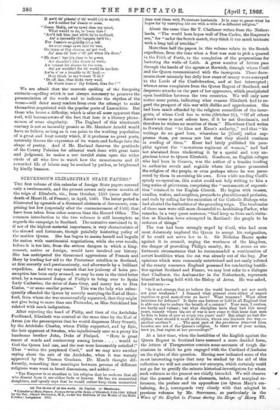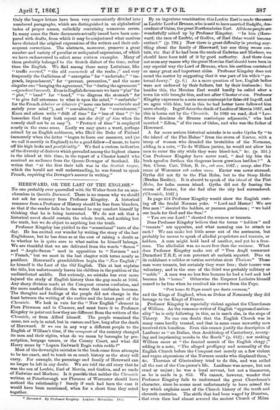STEVENSON'ff ELT2ABETHAN STATE PAPERS.v 'THE first volume of this calendar
of foreign State papers covered only a twelvemonth, and the present covers only seven months of the reign of Elizabeth, viz., from October, 1559 (soon after the death of HenrilL of France), to April, 1560. The latter period is illustrated by upwards of a thousand-abstracts of documents, com- prising but few (especially after the commencement of 1560) that have been taken from, other sources than the Record Office. The common introduction to the two volumes is still incomplete as regards the campaign in Scotland. The narrative contained in it, if not of the highest material importance, is very characteristic of the shrewd and fortunate, though painfully hesitating policy of the maiden Queen. She has begun to amuse herself and beguile the nation with matrimonial negotiations, while she ever recoils, before it is toe late, from the serious dangers in which a king- consort, native or foreign, would have involved our history. .She has anticipated the threatened aggressions of Francis and Mary by lendingher aid to the Protestant rebellion in Scotland, at first covertly and. parsimoniously, and afterwards by a brilliant expedition. And we may remark that her jealousy of heirs pre- munptive has been early aroused; as may be seen in the third letter cited, by & rumoured design: of Philip's to bring over to Spain Lady Catharine, the sister of Jane Grey, and marry her to Don Carlos, "or some smaller person." This was the lady who subse- quently offended the Queen by secretly marrying the Earl of Hert- ford, from whom she was unsuccessfully separated, that they might not give being to more than one Pretender, as Miss Strickland has related with much indignation.
After rejecting the hand of Philip, and them of the Archduke Ferdinand, Elizabeth was courted at the same time by the Earl of Arran (on the pnesumption that he would dispossess Mary Stuart). by the Archduke Charles, whom Philip supported, and by Eric, the heir apparent of Sweden,. who injudiciously sent as a proxy his handsome brother John, Duke of Finland. "Here is great resort of words and controversy among lovers . . . . would to God the Queen had one, and the rest were honourably satisfied !" Thus "writes the perplexed Cecil," and we may note another saying about the suit of the Archduke, when it was warmly approved by Sir Thomas Gresham. Dr. Mundt thought dif- ferently, remarking that marriages between persons of different religions were wont to breed dimensions, and added :—
" The Emperor is so steadfast in his religion that he reckons that all who dissent from it are either fools or knaves. He has six unmarried daughters, and' openly says that he would rather keep them unmarried (a) The choice of all tits world. (6) Capital. (e) Handsome.
• Cakeder tof State Papers. Foreiga Series of tfie Reign ofElisabeth, 1559-1560. Edited by the Rev_ Joseph Stevenson, M.A., under the direction of the Mater of the Rolls. London: Longusaua 1555.
than wed them with Protestant husbands Hie easy to guess-what he hopes for by marrying. his son with a. wife -of &different religion."
About the same time Sir T. Challoner writes from the Nether- lands, "The world here hopes well' of Don Carloa, the Emperor's son," for "as for the Scotch match, theythink it too much intricate with a long tail of troubles."
More than- half the papers in this, volume' relate- to the Scotch expedition, from the time when a, fleet was sent to pick a quarrel in the Frith of Forth, to the completion of the preparations for battering the walls' of Leith. A great. number of letters pass through thelandsof the agentest Berwick, through whom. Cecil and the Queen- communicated with' the insurgents. These &ce- ments show minutely but drily how sumwof money were conveyed to the Lords of the Cordederation, and at last intercepted ; whence arose complaints from the Queen Regent of' Scotland; and desperate attacks on the-part of her opponents, whicliprecipitated open hostilities- between the two countries. We will only now notice some points, indicating what reasons Elizabeth had to re- gard the prospect of this- warwith dislike and apprehension. She had been, much offended' by- the religious councillors of the insur- gents, of whom Cecil has to write (Ottober 31), "Of all others Knoes name is most odious here, if it be not Goodman's, and therefore he wishes- no mention, of them." Eleewhere-Cecil writes to Berwick that "he likes- not Knox's audacity," and that "his writings do no geed hem, wherefore he [Cecil] rather sup- presses them, yet menus nob but thee they should continue in senclieg- of' them.' Knox- had lately- published his pam- phlet against the- "monstrous regiment, of women," and had not abstained from. vindicating it by a. special an.d. very un- gracious letter to.Queen Elizabeth. Gooffinan, an- English refugee who had been in Geneva, was the author of a treatiM, tending tn authorize revolt and regicide where the prince permeated the religion of the people, or even, perhaps- where he was perse- cuted by them, in exercising his own. Even while needing Cecil's speedy co-operation, this zealot could. nothelp writing, to him a long series of grievance* comprising, the "monument., of supersti- tion" retained in the English Church.. He begins with crosses, candles, wafera, and surplices, proceeds to pluralities and prelacies, and ends by calling for 'the execution of the Catholic Bishops, who had abetted the barbaritiesof the preceding reign. The tendencies of these men were still more distasteful to, Archbishop Parker, who remarks, in a very queer sentence, "God keep us from such visita- tion as Knockes have: attempted in Scotland : the people to, be orderers of thing*"
The war had, been. strongly urged by Cecil,, who had even most dolorously implored the Queen to accept his resignation, if he could not serve her in it. Sir Nicholas Bacon spoke against it in council, urging the weakness of the kingdom, the danger of provoking Philip's enmity, &c. It seems an un- fortunate circumstance that he recommended. a continuation of covert hostilities when the cat was already out of the bag. For opinions which were commonly entertained and not easily refuted of the scanty resources England possessed for conducting hostili- ties against Scotland and France, we may best refer to a dialogue that Challoner, the Ambassador in the Netherlands, represents himself as having held with the Bishop of Arras. He was asked, for instance :—
"Is it not strange that ye believe the world knoweth not nor seeth not your weakness ? I demand what present store either of expert captains or good men-of-war ye have? What treasure? What other furniture for defence? Is there one fortress or holdin all England that is able one day to endure the breath of a cannon? Your men, I confess, are hardy and valiant; but what discipline have they had this many years, namely where the art of war is now come to that issue that men be fain to learn of new at every two years' end? But admit ye had dis- cipline, what should it avail in division, *here one draweth one way,— another another?. . . . The most part of the provinces removed from London are not of the Queen's religion. Is there not of your nobles, trow ye, that repine at her proceedings?"
At a later time, when the hostilities of the English against the Queen Regent in Scotland have assumed a more decided form, the letters of Throgmorton contain some accounts of tough dis- cussions in which he gets engaged with the Cardinal d'Amboise on the rights of this question. Having now indicated some of the most interesting topics that may be studied by- the aid of this collection we will not continue our excerpts, which certainly could not go far to gratify the minute historical investigators for whom such volumes as the present are chiefly intended. We will observe '4 that the general form. of the abstracts, index,, and marginal re- ferences, the preface and its appendices (on Queen Mary's em- balming, &c.), corresponds very closely with that adopted in previous volumes by Mr. Stevenson, as particularly in the Wars of the English in France during the Reign of Henry, VI. Only the longer letters have been very conveniently-divided into numbered paragraphs, which are distinguished in an alphabetical index of proper names, unluckily containing numerous erruni. In many cases the State documents actually issued have been com- pared with drafts, from ,whieli it may be conjectured what' motives have dictated the original expressions of the writers and their sub- sequent corrections. The abstracts, moreover, preserve- a great number and variety, of peculiar or antiquatedexpressions, of which -we have endeavoured to select some curious examples. M:anyof them probably belonged'to the Scotch dialect of the time, rather than the English. We fliul among these many Latiniams, like 4' traffic everted;"- "the old' consuetude of the realm ;"' and very frequently the Galliaisms of "enterprise ": for "undertake," "im- peach, impeachment," for. "prevent, prevention," and the more singular one "hanging the aweementrfor "during the agreement " —(pendant Paccord). Even in English de cuments we hare- "plat" for " plot," " band " for "bond," "to disgross the stomach" for " to give full utterance to what is npon the mind," "-eselarishe " for the French Iclairer or gelaircir (" none can better esclarishe and satisfy your mind"), and' " convalescing" for "convalescent" Knox and others write "drift of' time" for "loss of time" (" he 'beseeches God they both repent not the drift of time when the remedy shall not be so easy "). " Protract of tithe" is employed nearly in the same sense. tastlY we may quota a word, perhaps coined by an English nobleman; who liked the Duke of Finland immensely when the latter "began ta learn our manners; and' (as we call it merrily in England) to be a good fellovr—I mean, to leave ()This high looks and- pontifteiality." We find a curious indication of the diversity of dialects which prevailed-among the highest classes in the island at this time, in the report of a Chester herald who received an audience from the Queen-Dowager of Scotland. He 'writes that "at the first their talk was in the Scottish tongue, which the herald' not well understanding, he was fbrced to speak French, requiring the Dowager's answer' in writing."































 Previous page
Previous page